Reserve Bank of Australia Annual Report – 2018 International Financial Cooperation
The Reserve Bank participates actively in initiatives that seek to address the challenges facing the global economy and improve the global financial architecture. It does so through its membership of global and regional forums and its close bilateral relationships with other central banks.
Group of Twenty (G20)
Purpose
The G20 facilitates international cooperation on economic, financial and other policy issues among 19 systemically important economies from all regions of the world – including Australia – as well as with the European Union, International Monetary Fund (IMF) and other international organisations.
Reserve Bank Involvement
The Reserve Bank is represented at high-level meetings of the G20 by the Governor and Assistant Governor (Economic), while other senior staff participate in G20 working groups and contribute to the G20's financial regulation reform agenda.
The G20 presidency was held by Germany from December 2016 to November 2017. In December 2017, the G20 presidency rotated to Argentina. A key theme of the Argentinian presidency is the future of work, where the focus has been on harnessing the benefits of technological change and identifying appropriate policy responses to support the associated economic transition and foster inclusive growth. Another important theme has been the promotion of infrastructure investment. Argentina established the Infrastructure Working Group, which is co-chaired by the Australian Treasury, to pursue this work. In April 2018, the G20 endorsed the Roadmap to Infrastructure as an Asset Class, which sets out a wide-ranging plan to address common barriers to private investment in infrastructure.
The G20 has continued to focus on strengthening the international monetary system. As part of this, the G20 has reiterated its commitment to further strengthening the Global Financial Safety Net, with a strong, quota-based and adequately resourced IMF at the centre. Accordingly, the G20 has committed to complete a review of the IMF's permanent ‘quota’ resources by late 2019; this review could influence the IMF's lending capacity over coming years. The G20 has also recently discussed the management of risks stemming from excessive volatility in capital flows, as well as how to promote sovereign debt sustainability and optimise multilateral development banks' balance sheets.
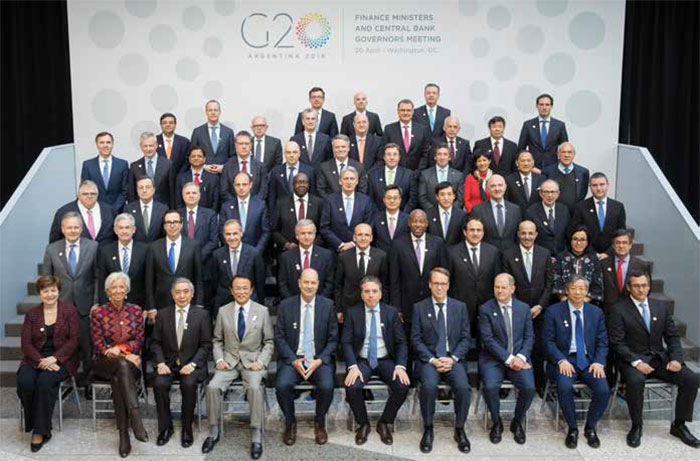
Financial regulation reform remains another important area of focus for the G20. Following the global financial crisis, major reforms were introduced globally, including Basel III (to build resilient financial institutions) and policies to mitigate the risks posed by systemically important financial institutions. As many of these post-financial crisis policy reforms have now been implemented, the G20 and Financial Stability Board (FSB) are increasingly focusing on assessing the effectiveness of the reforms, and whether there have been any material unintended consequences. Accordingly, work is currently under way to assess whether core financial reforms are achieving their intended outcomes. The G20, in conjunction with the FSB and the global standard-setting bodies, also continues to monitor new and emerging developments and risks. This includes cyber threats and the financial stability implications of financial technology (‘fintech’), including crypto-assets. The Reserve Bank, along with other Council of Financial Regulators (CFR) agencies, continues to work with overseas counterparts on these and other global regulatory issues.
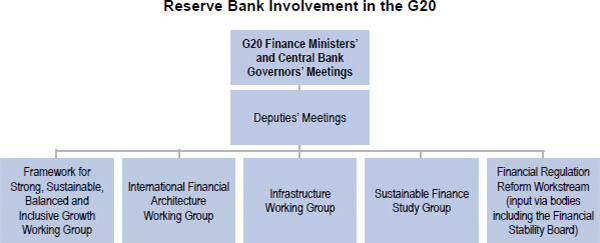
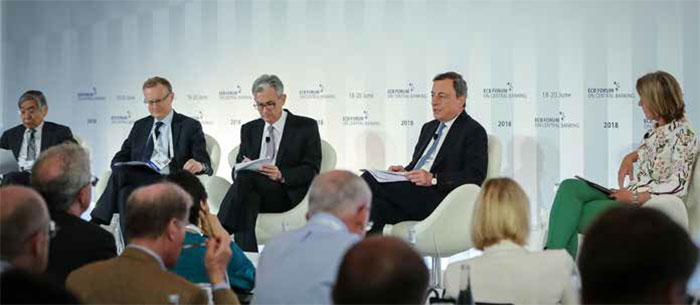
Financial Stability Board (FSB)
Purpose
The FSB promotes international financial stability by coordinating national financial sector authorities and international standard-setting bodies as they work towards developing strong regulatory, supervisory and other financial sector policies. It also plays a central role in assessing new and evolving trends and risks.
FSB members include representatives from 24 economies as well as the main international financial institutions – including the Bank for International Settlements (BIS) and the IMF – and standard-setting bodies such as the Basel Committee on Banking Supervision (BCBS).
Reserve Bank Involvement
The main decision-making body of the FSB is the Plenary. The Governor is a member of the Plenary, as well as the Steering Committee and the Standing Committee on Assessment of Vulnerabilities. The Governor is also Co-Chair of the Regional Consultative Group for Asia.
Senior staff members of Financial Stability Department participate in meetings of the:
- Analytical Group on Vulnerabilities, which supports the work of the Standing Committee on Assessment of Vulnerabilities
- Resolution Steering Group
- Financial Innovation Network.
While the FSB has continued to pursue regulatory reforms of the global financial system, its focus has shifted in recent years from policy design and development to monitoring the implementation of the post-financial crisis reforms.[1] As noted above, it has also begun examining the effects of reforms and has commenced evaluations of the effects on financial intermediation and on incentives to centrally clear over-the-counter derivatives.
The Standing Committee on Assessment of Vulnerabilities is the main FSB body for identifying and assessing risks in the global financial system. Supporting this committee is the Analytical Group on Vulnerabilities, with the Financial Innovation Network providing input to both groups in relation to financial innovation and the degree to which it could be a source of systemic risk. Risks associated with fintech remain a focus of the Standing Committee on Assessment of Vulnerabilities and the FSB and G20 more broadly, particularly in light of the growth of crypto-assets.
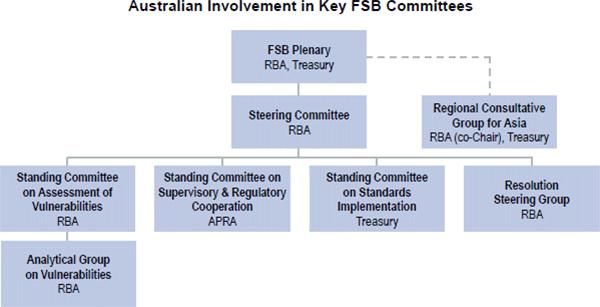
The FSB continues to examine ‘shadow banking’ (defined as credit intermediation involving entities and activities outside of the regular banking system) and its transition to resilient market-based financing. In a report to the G20 in 2017, the FSB noted that aspects of shadow banking that contributed to the financial crisis (such as collateralised debt obligations) had declined substantially since the crisis, and generally are no longer considered to pose financial stability risks. Nonetheless, the report noted that new forms of shadow banking are likely to develop in the future, emphasising the importance of continued monitoring to mitigate associated risks. This monitoring is conducted in part by the FSB's Shadow Banking Experts Group, on which the Reserve Bank is represented.
Reserve Bank staff members were also involved in a number of other key FSB work areas during 2017/18, including:
- meetings of the Resolution Steering Group, which is progressing the FSB's work on enhancing resolution frameworks in line with its Key Attributes of Effective Resolution Regimes for Financial Institutions (the Key Attributes). The Resolution Steering Group has worked on several specific areas during the year in review, including: the adequacy of resources for central counterparty resolution; principles for bail-in execution; guidance on bank resolution funding plans; and a Key Attributes assessment methodology for the insurance sector
- meetings of the Cross-border Crisis Management Group for Financial Market Infrastructures, a Resolution Steering Group subgroup working on resolution arrangements for central counterparties
- meetings of the Regional Consultative Group for Asia, one of six regional groups established to expand the FSB's outreach activities with non-member economies and to examine issues relevant for the region.
As a member of several FSB committees, the Reserve Bank hosts committee meetings from time to time. In November 2017, the Bank hosted meetings in Sydney of the Analytical Group on Vulnerabilities and the Regional Consultative Group for Asia.
Bank for International Settlements (BIS)
Purpose
The BIS and its associated committees play an important role in supporting collaboration among central banks and other financial regulatory bodies. They do so by bringing together officials to exchange information and views about the global economy, vulnerabilities in the global financial system and other issues affecting the operations of central banks.
Reserve Bank Involvement
The Reserve Bank is one of 60 central banks holding shares in the BIS. The Governor or Deputy Governor attends the bimonthly meetings of governors and participates in meetings of the Asian Consultative Council. The Governor chairs the Committee on the Global Financial System, and the Assistant Governor (Financial Markets) is a member of the Markets Committee and the Committee on the Global Financial System.
The Committee on the Global Financial System seeks to identify potential sources of stress in the global financial system and promotes the development of well-functioning and stable financial markets. During 2017/18, the committee's discussions included analysing the structural changes that have emerged in the banking industry since the global financial crisis and the implications of rising household debt for financial and macroeconomic stability. The Markets Committee considers how economic and other developments, including regulatory reform and technological change, may affect financial markets, particularly central bank operations. Recent topics of discussion have included: developments in major financial markets, including in China; the functioning of short-term funding markets; the potential implications of central bank digital currencies for monetary policy implementation; and central banks' role in the reform of financial benchmarks.
During 2017/18, Reserve Bank staff have participated in a number of working groups of the Markets Committee and Committee on the Global Financial System, including:
- a Committee on the Global Financial System experts group on the implications of short-lived changes in banks' balance sheets around reporting dates (‘window dressing’)
- a Markets Committee study group on fast-paced electronic markets, which is due to report later in 2018
- a Committee on the Global Financial System working group on establishing viable capital markets, which is due to report later in 2018
- a Committee on the Global Financial System working group on the financial stability implications of a prolonged period of low interest rates.
Basel Committee on Banking Supervision (BCBS)
Purpose
The BCBS is hosted by the BIS and is the international standard-setting body for the banking sector. It provides a forum for regular cooperation on banking supervisory matters among its 28 member jurisdictions. It seeks to enhance understanding of key supervisory issues and improve the quality of banking supervision worldwide.
Reserve Bank Involvement
The Governor is a member of the Group of Governors and Heads of Supervision, which is the oversight body for the BCBS.
The Assistant Governor (Financial System) is a member of the BCBS.
A Deputy Head of Financial Stability Department is a member of the Macroprudential Supervision Group.
During 2017/18, the Group of Governors and Heads of Supervision endorsed a package of reforms to the Basel III capital framework, which are designed to reduce unwarranted variability in banks' risk weights as well as to increase the simplicity, comparability and risk sensitivity of the Basel framework. The finalisation of the reforms is the culmination of several years of work, with the Reserve Bank and the Australian Prudential Regulation Authority (APRA), as BCBS members, contributing to these discussions. Domestically, APRA has issued a consultation paper on modifications to the domestic capital framework that take account of these Basel III reforms.
The Macroprudential Supervision Group focuses on supervisory policies designed to address systemic risk arising from the banking sector, especially those posed by systemically important banks (SIBs). The group discussed several issues during 2017/18, including the sources of macrofinancial risks, finalising the review of the identification methodology for global SIBs, and country experience with implementing the Basel III counter-cyclical capital buffer.
Committee on Payments and Market Infrastructures (CPMI)
Purpose
The CPMI is hosted by the BIS, and serves as a forum for central banks to monitor and analyse developments in payment, clearing and settlement infrastructures and sets standards for them. It has members from 27 jurisdictions.
Joint working groups of the CPMI and the International Organization of Securities Commissions (IOSCO) bring together members of these two bodies to coordinate policy work on the regulation and oversight of financial market infrastructures.
Reserve Bank Involvement
Senior staff members from Payments Policy Department are members of the CPMI, CPMI-IOSCO Steering Group, CPMI-IOSCO Implementation Monitoring Standing Group, and CPMI-IOSCO Policy Standing Group. Senior staff have also participated in the Working Group on Digital Innovations and a task-force on wholesale payments security. A senior staff member from Payments Settlements Department has participated in the CPMI's RTGS (Real-time Gross Settlement) Working Group.
A senior staff member from Payments Policy Department contributed to developing a framework for supervisory stress tests. Another senior staff member contributed to a joint CPMI and Markets Committee (of the BIS) report on central bank digital currencies which was published in March 2018. Staff members also contributed to a number of CPMI-IOSCO implementation monitoring reports that have been published in 2017/18, including a follow-up assessment of certain aspects of central counterparties' financial risk management arrangements.
Cooperative Oversight Arrangements
Purpose
Several overseas-based financial market infrastructures hold Australian clearing and settlement facility licences, for which the Reserve Bank has certain regulatory responsibilities under the Corporations Act 2001. An overseas-based payments system also plays an important role in Australia's financial system. The Reserve Bank participates in several multilateral and bilateral arrangements to support its oversight of these financial market infrastructures as set out below.
Reserve Bank Involvement
Staff from Payments Policy Department participated in:
- an arrangement led by the Federal Reserve Bank of New York to oversee CLS Bank International, which provides a settlement service for foreign exchange transactions
- a global oversight college and a crisis management group for LCH Limited, both chaired by the Bank of England
- an information-sharing arrangement with the US Commodity Futures Trading Commission, in relation to CME Inc.
- the Society for Worldwide Interbank Financial Telecommunication (SWIFT) Oversight Forum, chaired by the National Bank of Belgium.
International Monetary Fund (IMF)
Purpose
The IMF oversees the stability of the international monetary system via:
- bilateral and multilateral surveillance, which involves monitoring, analysing and providing advice on the economic and financial policies of its 189 members and the linkages between them – Article IV consultations, which are a key means to do this, are conducted for Australia every year
- the provision of financial assistance to member countries experiencing actual or potential balance of payments problems.
Reserve Bank Involvement
Australia holds a 1.39 per cent quota share in the IMF and is part of the Asia and the Pacific Constituency, which is represented by one of the IMF's 24 Executive Directors. The Reserve Bank supports the Constituency Office at the IMF by seconding an advisor with expertise in economic and financial sector matters. The Bank also works with the Australian Treasury to provide support to the Constituency Office on matters that are to be discussed by the IMF's Executive Board.
A core function of the IMF continues to be the provision of conditional financial assistance to member countries encountering balance of payments difficulties. During the IMF's 2017/18 financial year (which runs from May to April), the IMF provided three new lending arrangements (excluding concessional facilities) with a total value of 63 billion Special Drawing Rights (SDRs). There have been two new lending arrangements since the start of the IMF's 2018/19 financial year. This included a three-year SDR35 billion stand-by lending program to Argentina. IMF non-concessional credit outstanding increased by around 6 per cent in the 12 months to July 2018, with repayments by debtors more than offset by Argentina's use of its new arrangement.
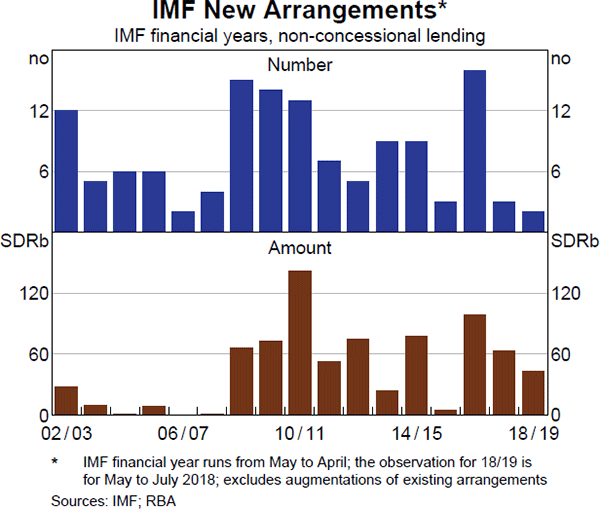
The Reserve Bank and other CFR agencies worked closely with the IMF during 2017/18 as part of the IMF's 2018 Financial Sector Assessment Program (FSAP) review of Australia's financial system and regulatory framework. The FSAP is conducted every five years or so in jurisdictions with systemically important financial sectors (Australia's previous FSAP was in 2012). The IMF is focusing on assessing financial sector vulnerabilities and the overall framework for systemic risk oversight. The FSAP will include an assessment of Australia's banking regulatory framework and supervisory practices. It will also include reviews of the regulation of financial market infrastructures and the insurance sector, and crisis management arrangements. Following initial discussions in December 2017 on the scope of the review, the IMF FSAP team conducted an advance mission in June 2018 that involved in-depth meetings with the Bank and other CFR agencies, other government bodies, and private sector firms such as banks. The IMF's main mission is planned for the second half of 2018. A report with the key findings of the FSAP review is expected to be published early in 2019.
Executives' Meeting of East Asia-Pacific Central Banks (EMEAP)
Purpose
EMEAP brings together central banks from 11 economies in the east Asia-Pacific region – Australia, China, Hong Kong SAR, Indonesia, Japan, South Korea, Malaysia, New Zealand, the Philippines, Singapore and Thailand – to discuss issues relevant to monetary policy, financial markets, financial stability and payments systems in the region.
Reserve Bank Involvement
The Reserve Bank participates in EMEAP, including at the Governor and Deputy Governor levels. Senior staff also participate in the EMEAP Working Groups on Financial Markets, Banking Supervision, and Payment and Settlement Systems, and in meetings of Information Technology (IT) Directors. These groups also maintain close relationships with international institutions, such as the IMF and the BIS, through regular dialogue on topical issues.
The Monetary and Financial Stability Committee meeting provides an important forum for the discussion of current economic and financial market issues of direct relevance to EMEAP members. As Committee Chair, the Reserve Bank chaired two meetings of the Monetary and Financial Stability Committee in 2017/18, which were hosted by Bank Indonesia and the Monetary Authority of Singapore. Among other matters, these meetings considered the risks of trade protectionism, the effect on the region of monetary policy actions in advanced economies, macroprudential policies and capital flows, and the outlook for inflation in the region. Developments in fintech were also an important focus, given the potential risks and benefits for the financial system and possible implications for policymakers.
The Working Group on Financial Markets focuses on the analysis and development of foreign exchange, money and bond markets in the region. Every second meeting of this group is held in conjunction with the BIS Financial Markets Forum. The group continued its work on developing local currency bond markets, through the Asian Bond Fund Initiative (see the chapter on ‘Operations in Financial Markets’ for details of the Reserve Bank's investments in the Asian Bond Fund). The focus in 2017/18 continued to be on development of money markets and securities lending in Asia.
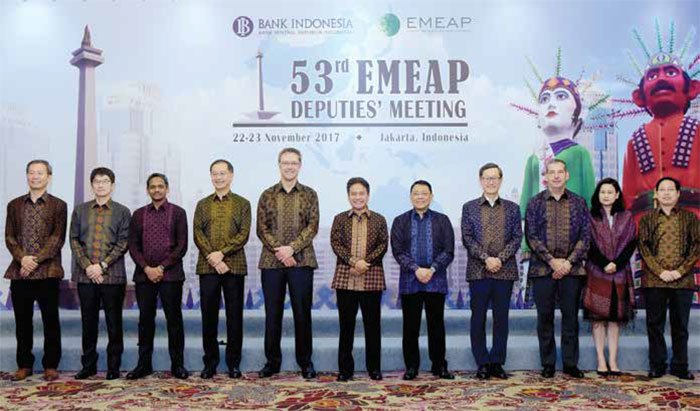
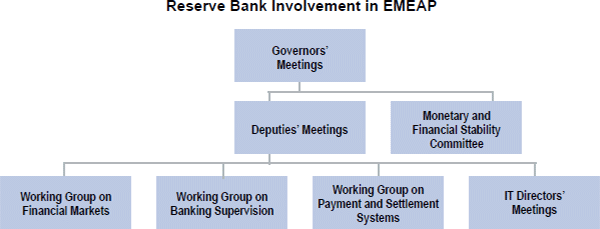
The Working Group on Banking Supervision (which also includes representatives of EMEAP members' prudential regulators, including APRA) is a regional forum to share experiences about best practices in banking supervision and to discuss issues of relevance in the region. During the year, the group discussed issues such as the implementation of Basel III and other post-financial crisis reforms in the region, crypto-assets, and the importance of cyber-security risk management in financial institutions. The group also continued its focus on more traditional banking-related issues, such as bank resolution regimes and recovery planning, liquidity and loan loss provisioning.
The Working Group on Payment and Settlement Systems (which has recently been renamed the Working Group on Payments and Market Infrastructures) is a forum for sharing information and experiences relating to the development, oversight and regulation of retail payment systems and financial market infrastructures. The group discussed a range of issues during the year in review, including the:
- application of new technologies and other enhancements to financial market infrastructures, particularly those focused on building resilience
- development of fast retail payment systems and other efforts to facilitate the shift towards electronic payments
- emergence of crypto-asset markets
- initiatives to promote fintech development.
A study group of the Working Group on Payment and Settlement Systems has been examining the development and impact of various digital innovations on financial systems and central banks in the EMEAP region. The areas of focus for this group have included payments-related fintech, distributed ledger technology, cryptocurrencies and central bank digital currencies.
The IT Directors' Meeting provides a forum for discussions on developments in IT and its implications for central banks. Recent meetings have focused on IT developments within central banks, including the delivery of services and the IT underpinning payments systems.
Organisation for Economic Co-operation and Development (OECD)
Purpose
The OECD comprises the governments of 36 countries and provides a forum in which governments can work together to share experiences and seek solutions to common problems, including economic and financial ones.
Reserve Bank Involvement
The Reserve Bank's Chief Representative in Europe participates in the OECD's Committee on Financial Markets and the Advisory Task Force on the OECD Codes of Liberalisation.
The OECD Committee on Financial Markets examines a range of financial market issues and aims to promote efficient, open, stable and sound financial systems. As part of this effort, the committee holds semi-annual discussions with private sector experts, which recently covered long-term financing of sustainable infrastructure, convertible bonds and GDP-linked debt. The committee has also continued to review and contribute to the OECD's work on fintech and digitalisation, financial sector guarantees, long-term investment financing and green financing.
The OECD's Codes of Liberalisation are rules-based frameworks to promote the freedom of cross-border capital movements and financial services. All OECD members adhere to the codes. The Advisory Task Force on the OECD Codes of Liberalisation meets periodically to address questions and discuss policy issues related to the codes. It also examines specific measures by individual adherents with relevance to their obligations under the codes. During 2017/18, the task force continued to focus on its review of the Code of Liberalisation of Capital Movements.
Technical Cooperation and Bilateral Relations
The Government Partnership Fund
The Australian Government's ‘Government Partnership Fund’ program has supported an exchange of skills and knowledge between Australian public sector institutions and their Indonesian counterparts through a series of attachments and workshops since 2005/06.
In 2017/18, a total of 18 Bank Indonesia staff members were attached to the Reserve Bank, covering the areas of economic modelling, financial stability and human resources. These visits brought the total number of individual attachments since the start of the program to 215.
Engagement in the South Pacific
The Reserve Bank fosters close ties with South Pacific countries through participation in high-level meetings, staff exchanges and the provision of technical assistance across a wide range of central banking issues.
In November 2017, the Reserve Bank participated in the annual meeting of South Pacific Central Bank Governors, held in Nuku'alofa, Tonga. In addition to discussing recent economic developments in the region, there was considerable discussion of developments in correspondent banking and remittance flows in the region. There was also a meeting with the major regional commercial banks to discuss banking issues.
The Reserve Bank of Australia Graduate Scholarship for Bank of Papua New Guinea officers to undertake postgraduate studies at an Australian university in the areas of economics, finance and computing was first awarded in 1992. The most recent recipient of this scholarship commenced studies at the University of Queensland in July 2018; the previous recipient completed their studies in October 2016.
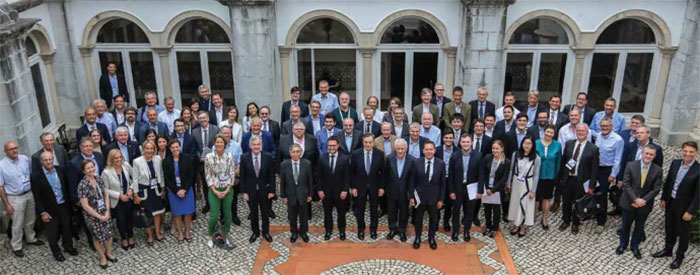
During 2017/18, Bank officers visited Papua New Guinea and Samoa to discuss monetary policy issues.
International visitors and secondments
As in previous years, the Reserve Bank hosted a number of overseas visitors, predominantly from foreign central banks. The visits covered the full range of the Bank's activities and included delegations from China, Indonesia, South Korea, Papua New Guinea, Russia, Saudi Arabia and the United States. The Bank also hosted a number of secondees from the Bank of Canada, the Bank of England and the Reserve Bank of New Zealand. A number of Reserve Bank staff were seconded to other central banks and various international organisations, including the BIS, the Bank of Canada, the Bank of England, the United States Federal Reserve, the IMF, the OECD and the Reserve Bank of New Zealand. These arrangements facilitate a valuable exchange of skills and expertise between the Bank and the broader global economic and financial policymaking community.
Footnote
Further detail on FSB activities is reported in the Reserve Bank's semi-annual Financial Stability Review. [1]